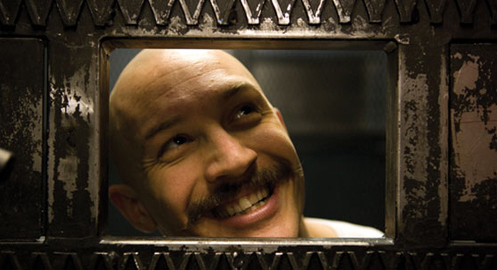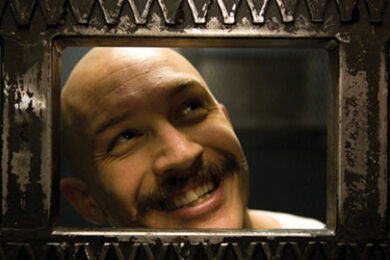In only a few years on the scene, Vertigo Films has carved out quite a nice little niche for themselves. They are known for making films like Football Factory, The Business and It’s All Gone, Pete Tong that are very British in feel and deal with themes like football hooliganism, organised crime, and DJ culture – that and single-handedly keeping Danny Dyer employed.
Their films have done a good trade but haven’t always faired so well critically. These are essentially laddish flicks with a flashy style – this generally includes: 1) graphic violence synced to northern soul, 2) mismatched film stocks and 3) inappropriate slowmo – the standard Guy Ritchie arsenal.
Normally this trick is about as convincing as a thug in a suit, but latest offering Bronson seems to be a film of a different calibre. Its style is not just a gimmick or an afterthought, it’s an integral part of the storytelling and is executed with both skill and ‘restraint’ (to use the word incredibly loosely).
It is the story of Britain’s most violent prisoner, Charlie Bronson (Michael Peterson) who, in the course of over 30 years of incarceration, tested the boundaries of the correctional system. His nihilistic compulsion to lash out at any and all authority figures seemed to stem from a need to be infamous.
The idea of pursuing celebrity through violence makes Bronson very similar to its Aussie equivalent Chopper, the film about criminal turned writer Mark Read. Whereas Chopper was tragic and gave its anti-hero a human face, Bronson has about all the introspection of a pro-wrestling match. as Bronson (played by Tom Hardy) who provides the narrative voice.
This gives an air of wilful distortion that’s in line with Bronson’s demented self image. It’s like a tramp telling you his life’s story – you know it’s all lies and exaggerations which, over years of drunken retellings, have coalesced into a kind of personal mythology, but you listen anyway because it’s kind of fascinating, and he might beat you up if you don’t.
It’s an uncomfortable watch, not just because of the violence perpetrated but because the punches are thrown from Bronson’s skewed perpective. The imposed intimacy with this moustachioed nut job has a strange effect. (In fact, this reviewer left the cinema seeing red. "You fucking what!?" I says to the subway man asking if I want double cheese on my sub of the day.)
It’s impressive then for all the sadistic violence and grotesque tone how eminently watchable the film is. This is mostly down to the writer director Nicolas Winding Refn who has an artists’ eye and a theatre directors’ sense of staging. Every shot is notable for the angle, the colour, the timing or even some thoughtful set detail in the corner. The film never falls into any prescribed laws of film school filmmaking – establishing shot, two camera dialogue etc.
The real kudos, however go to Tom Hardy (who, sans-moustache, looks a bit like Will Young). He nails the required mix of charisma and menace, moving effortlessly from Bronson the class clown to Bronson the caged animal. Every pause in his sporatic speech hangs heavy, always about to erupt into brutality. No attempt at all is made to explain why Bronson is so violently at odds with society but, thanks to Hardy, you never for a second doubt that he is.
Bronson encounters a string of almost Lynchian oddball characters (paedophiles, guards, transvestites, gays, strippers and art instructors) with whom he briefly connects before their relationship inevitably goes sour. There are even genuinely touching moments, always teetering on the edge of violence. The plot is like a demented duck shooter game in which a string of highly punchable characters get up in Bronson’s brooding grill while he decides whether or not he should nut them. Surprisingly this formula doesn’t get stale.
The humour is genuine as well – mostly visual gags and well delivered lines as opposed to insults and slapstick. The mix of mostly classical music punctuated with 80s electro perfectly compliments the schizophrenic tone.
Some highly problematic title cards appear near the end explaining how much of the protagonist’s life has been spent in solitary confinement – as if we are watching something like The Killing Fields and are supposed to leave the cinema and do something about it. But Bronson is surely entirely deserving recipient of a sojurn at Her Majesty’s Pleasure. If anything this film makes a very compelling argument that solitary confinement is the only answer for those as warped and violent as Bronson. It’s very impressive that the film crafts a character who you can spend two hours with but who you don’t like or trust. Any pity the ending attempts to illicit from the audience is severly misplaced.
There is no message to Bronson, certainly no lessons to be learned. It’s simply an interesting story with colourful characters. Hunger it ain’t, but as a film in the gleefully experimental (and tasteless) tradition of Natural Born Killers it stands up quite well. Despite their, in my mind, patchy track record, Vertigo have finally made a film which is truly unforgettable instead of just a film that thinks it’s unforgettable.



